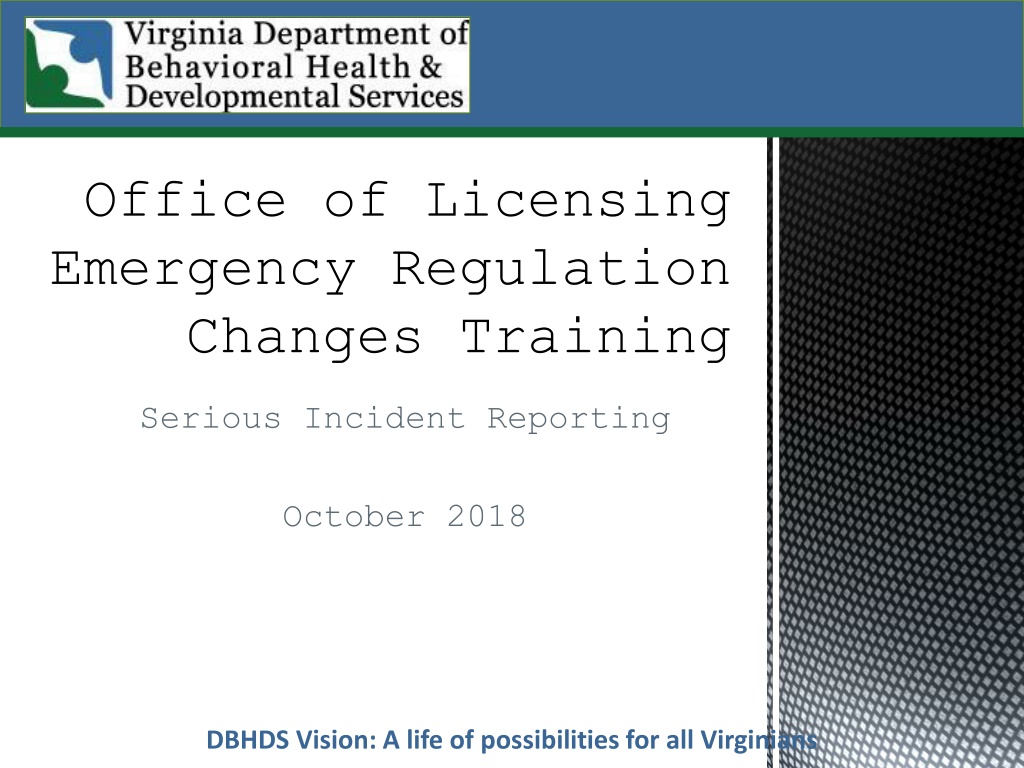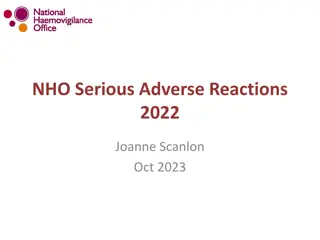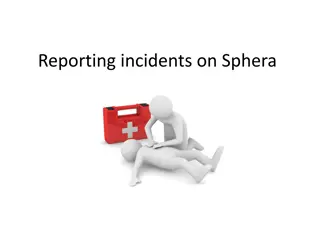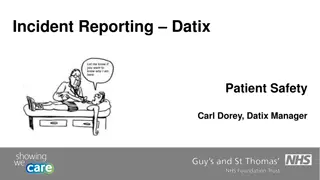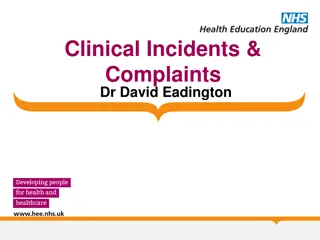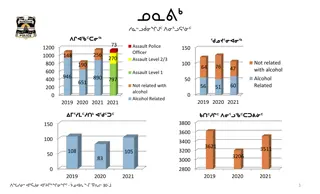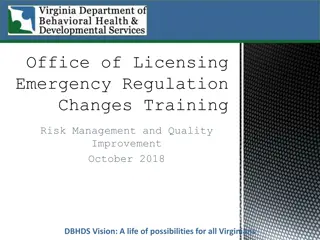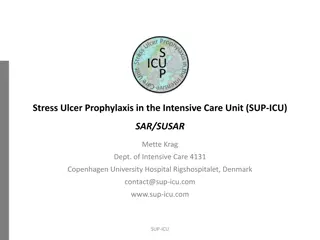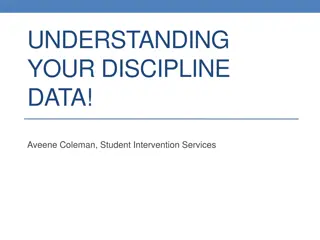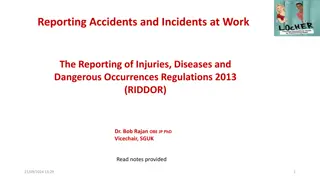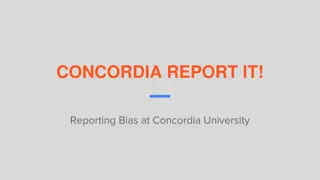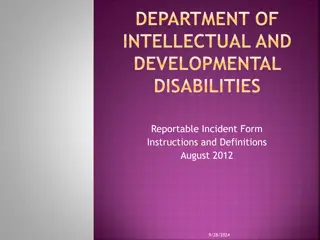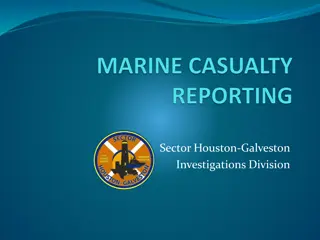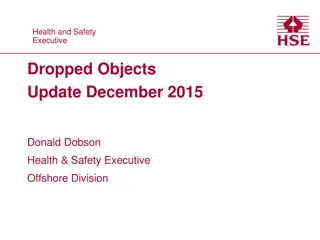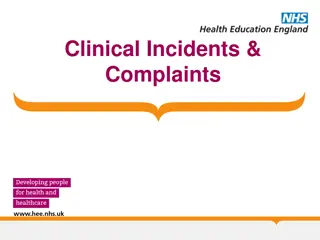Understanding Level I Serious Incidents Reporting
Defining and discussing Level I Serious Incidents in the context of DBHDS regulations, including the criteria, reporting requirements, and examples. Learn how to identify, document, and analyze incidents that occur during service provision or on provider premises, ensuring the safety and well-being of individuals.
Download Presentation

Please find below an Image/Link to download the presentation.
The content on the website is provided AS IS for your information and personal use only. It may not be sold, licensed, or shared on other websites without obtaining consent from the author. Download presentation by click this link. If you encounter any issues during the download, it is possible that the publisher has removed the file from their server.
E N D
Presentation Transcript
Office of Licensing Emergency Regulation Changes Training Serious Incident Reporting October 2018 DBHDS Vision: A life of possibilities for all Virginians
Definition of Serious Incident DBHDS regulation 12VAC35-105-20 defines a serious incident as any event or circumstance that causes or could cause harm to the health, safety, or well-being of an individual. The term serious incident includes death and serious injury. Guidance: provision of service means that the incident occurs when the provider is actively providing a service to the individual. Serious incidents are broken down into three levels which correspond with additional requirements for reporting and root cause analysis. Level II serious incident now includes serious injury. The definition of serious injury was amended to align with the Office of Human Rights definition for serious injury. Slide 2
Level I Serious Incidents
Level I Serious Incidents Definition Level I serious incident" is a serious incident that: Occurs/originates during the provision of a service or on premises of provider and does not meet definition of a Level II or Level III serious incident. Does not result in significant harm to individual(s), but may include events that result in minor injuries that do not require medical attention,(e.g., scrapes, bruises, blister, minor sprain). Events that have the potential to cause serious injury, even when no injury occurs (e.g., a fall with no serious injury).
Level I Serious Incidents - Reporting Requirements Providers Actions: Required: To collect, maintain and review at least quarterly all Level I serious incidents as part of their quality improvement program per 12VAC35-105-160. Level I serious incidents should be monitored to minimize the risk of the occurrence of additional Level I, II, or III incidents in the future. Not Required: To report Level I serious incidents into the Department s web-based reporting application (CHRIS).
Level I Serious Incidents - Example Individual reports to her case manager that she fell off of her bicycle at her group home and scraped her knees and elbows a little bit. The incident would be documented as a Level I incident by the licensed group home but not by the case manager. Questions the case manager might consider: 1. What was the level of harm to the individual? (aka what level serious incident was this?) 2. Was the individual actively receiving case management at time of injury? 3. Was the individual on the premises of the case manager at the time of the incident?
Level I Serious Incidents - Example Continued Answers: 1. The individual sustained minor injuries that did not require medical attention (a Level I serious incident). 2. The individual was not actively receiving services from the case manager at the time of the incident. 3. The individual was not on the premises of the case manager at the time of the incident. Action: Because this was a Level I serious incident that occurred outside of the provision of the case manager s services and not on their property, the case manager is NOT required to report the incident in CHRIS or track the incident internally as part of their quality improvement program.
Level I Serious Incidents Office of Licensing Requirements What will the Office of Licensing look for during licensing inspections? 1. Proof of staff training on new definitions and corresponding reporting requirements. 2. Whether the provider s Quality Improvement Program includes a consistent process for collecting and reviewing all Level I serious incidents and how such reviews resulted in quality improvement initiatives.
Level I Serious Incidents - Tracking Providers must collect, maintain, and review at least quarterly all Level I serious incidents that occur when the individual is within the provision of their services or on their property as part of their Quality Improvement Program (QIP) per 12 VAC 35-105-160. Reviews must include: 1) An analysis of trends and potential systemic issues or causes; 2) Indicated remediation; and 3) Documentation of steps taken to mitigate the potential for future incidents. Slide 9
Level II Serious Incidents
Level II Serious Incidents Definition "Level II serious incident" means a serious incident that: 1. Occurs or originates during the provision of a service; or 2. On the premises of the provider that results in: A significant harm or threat to the health and safety of an individual that does not meet the definition of a Level III serious incident. "Level II serious incident" also includes a significant harm or threat to the health or safety of others caused by an individual.
Level II Serious Incidents Timeframe for Reporting per 12VAC-105-160 Level II serious incidents shall be reported within 24 hours of discovery. Reported information shall include the information specified by the department as required in CHRIS, and at least the following: The date, place, and circumstances of serious incident. For serious injuries, include the nature of the individual's injuries and any treatment received. For all other Level II incidents, also include the consequences or risk of harm that resulted from the serious incident. Slide 12
Level II Serious Incidents Reporting Requirements Providers are only required to report Level II serious incidents that occurred or originated during the provision of their service or on their premises. What does this mean? If a provider is notified of a Level II incident that occurred when the provider was not actively providing services and the incident did not occur on their property, then the provider is not required to report the incident.
Level II Serious Incidents Reporting Requirements Continued Per the definition of residential service in 12VAC35-105-20, residential service providers provide 24-hour support to individuals. Therefore residential providers are responsible for reporting Level II serious incidents even when individual is receiving services from another licensed provider. However, if an individual receiving residential services experiences a Level II serious incident while actively receiving services from another licensed provider, the residential service provider is not required to report the incident if they verify that the other provider reported the incident. Slide 14
Level II Serious Incidents Case Manager Example An individual receiving case management services reports to her case manager that last week she fell off of her bike at her group home and broke her arm. Questions the case manager might consider: 1. What was the level of harm to the individual? (aka what level serious incident was this?) 2. Was she the individual actively receiving case management at time of injury? 3. Was the individual on the premises of the case manager at the time of the incident? Slide 15
Level II Serious Incidents - Case Manager Example Continued Answers: 1. The individual sustained significant harm - a broken arm (a Level II serious incident). 2. The individual was not actively receiving services from the case manager at the time of the incident. 3. The individual was not on the premises of the case manager at the time of the incident. Action: The case manager is not required to report the incident because the incident did not occur or originate within the provision of the case managers service or on their property. However, the residential provider is required to report the incident because the incident occurred within the provision of their service.
Level II Serious Incidents Residential Provider Example Example: An individual, living in a group home, breaks his arm while at his day program. Provider Action: The group home provider is not required to report the serious injury as long as they verify that the day program provider reported the incident. Slide 17
Level II Serious Incidents Include but are not limited to the following: A serious injury; An individual who is missing; An emergency room or urgent care facility visit when not used in lieu of a primary care physician visit; An unplanned psychiatric or unplanned medical hospital admission; Choking incidents that require direct physical intervention by another person; Ingestion of any hazardous material; or A diagnosis of: A decubitus ulcer or an increase in severity of level of a previously diagnosed decubitus ulcer; a bowel obstruction; or aspiration pneumonia. Slide 18
Level II Serious Incidents - Serious Injury DBHDS regulation 12VAC35-105-20 defines a serious injury as any injury resulting in bodily hurt, damage, harm, or loss that requires medical attention by a licensed physician, doctor of osteopathic medicine, physician assistant, or nurse practitioner. Examples: fracture concussion injury requiring stiches sprain Slide 19
Level II Serious Incidents An Individual who is Missing DBHDS regulation 12VAC35-105-20 defines missing as a circumstance in which an individual is not physically present when and where he should be & his absence cannot be accounted for or explained by his supervision needs or pattern of behavior. Example: An individual s support plan indicates a need for staff supervision to ensure safety when leaving the group home. The Individual leaves the house and walks down the street to the store without staff knowledge or support. Provider Action: The individual is missing and the group home provider must report the incident as a Level II serious incident.
Level II Serious Incidents An Emergency Room or Urgent Care Facility Visit Providers are not required to report if they have to take an individual to an urgent care facility or emergency room for an issue typically treated by a primary care physician because the individual s primary care physician is not accessible at the time treatment is required. Example: If an individual is taken to an urgent care facility over the weekend because the provider believes the individual has a urinary tract infection and the individual s primary care physician is closed over the weekend. Provider Action: Provider does not need to submit an incident report as the urgent care facility is being used in lieu of a primary care physician visit because the doctor s office is closed over the weekend. This would be considered a Level I seriousincident. Slide 21
Level II Serious Incidents An Emergency Room or Urgent Care Facility Visit Continued If the same individual is taken to the ER over the weekend for a urinary tract infection and the individual is admitted to the hospital, the provider shall report the incident as a Level II serious incident because it is an unplanned hospital admission. Slide 22
Level II Serious Incidents - Unplanned Psychiatric or Medical Hospital Admission Unplanned Medical Admission Examples: Appendicitis Burn Flu Sepsis Heart attack Stroke Uncontrolled seizure High fever Dehydration Stroke Unplanned Psychiatric Admission Examples: Psychosis Mania Severe depression Suicidal ideations Slide 23
Level II Serious Incidents Unplanned Psychiatric Hospital Admission Providers shall only report unplanned psychiatric hospital admissions if the admission occurs while the provider is actively providing the licensed service or if the admission happens on the premises of the provider. If an individual is only receiving licensed emergency services (crisis intervention) and no other licensed service at the time of a temporary detention order (TDO), the emergency services provider is not required to report the admission. Slide 24
Level II Serious Incidents Unplanned Psychiatric Hospital Admission Continued If an individual requires a Temporary Detention Order (TDO) during the provision of a licensed service, this provider is required to report the unplanned admission. Example 1: If an individual is receiving case management services at the time of the unplanned hospital admission, the case manager is only required to report the incident if the admission occurred while the case manager was actively providing case management to the individual or if the individual was on the premises (at CSB) waiting to receive services. Example 2: If an individual is receiving CM & Day Support services, or CM & MH or SA outpatient services, but none of the licensed providers are actively providing services at the time of the TDO, then the providers are not required to submit an incident report. Slide 25
Level II Serious Incidents - Choking incidents that require direct physical intervention by another person If an individual experiences a choking incident that requires abdominal thrusts, back blows, clearing the airway or CPR, the appropriate provider must report the incident. If an individual chokes on food but is able to cough up the food by themselves, then the provider is not required to report the incident. The choking incident should be recorded by the appropriate provider as a Level I serious incident, as choking is an event that has the potential to cause serious injury. Slide 26
Level II Serious Incidents Ingestion of Any Hazardous Material The appropriate provider is required to report as a Level II serious incident if any individual drinks, swallows, or absorbs a material that causes significant harm to the individual or is a threat to their health and safety. Slide 27
Level II Serious Incidents - Diagnosis A diagnosis of: A decubitus ulcer or an increase in severity of level of previously diagnosed decubitus ulcer; A bowel obstruction Aspiration pneumonia Providers shall report the diagnosis as a Level II serious incident following a formal diagnosis by a licensed or certified medical professional. Providers should also review the appropriate DBHDS safety alerts. Slide 28
Level III Serious Incidents
Level III Serious Incidents - Definition Level III serious incident" means a serious incident whether or not the incident occurs while in the provision of a service or on the provider s premises and results in: 1. Death of an individual; 2. Sexual assault of an individual; 3. Suicide attempt by an individual that results in a hospital admission; or 4. A serious injury of individual resulting in or likely will result in permanent physical or psychological impairment;
Level III Serious Incidents Timeframe for Reporting Level III serious incidents shall be reported within 24 hours of discovery. Reported information shall include the information specified by the department as required in CHRIS, and at least the following: the date, place, and circumstances of serious incident. For serious injuries and deaths, include the nature of the individual's injuries or circumstances of the death and any treatment received. For all other Level III incidents, also include the consequences or risk of harm that resulted from the serious incident. Deaths that occur in a hospital as a result of illness or injury occurring when the individual was in a licensed service shall be reported. Slide 31
Level III Serious Incidents Reporting Requirements All providers must report all Level III serious incidents even if the incident did not occur or originate on the provider s premises or while the provider was actively providing services. This means providers should report even if reporting will result in duplicative reporting.
Level III Serious Incidents Death of an individual Any provider, including case managers, must report the death of any individual receiving services at the time of death whether or not provider was actively providing a service at the time of the death, even if this means duplicative reporting Slide 33
Level III Serious Incidents - Death Example Example: A case manager receives notification that an individual who also receives day support services and residential services died over the weekend. Provider Actions: The case manager, day support provider, and residential services provider are all required to report the death as a Level III serious incident. Slide 34
Level III Serious Incidents A Sexual Assault of an Individual Any sexual assault required by other applicable laws to be reported to other relevant authorities shall be reported to those authorities in accordance with law. The department recognizes that reporting an allegation of sexual assault could impact the therapeutic relationship of the individual with the provider; therefore, reporting should be trauma-informed and respect the therapeutic relationship. The provider should report any sexual assault of an individual receiving services alleged to have resulted from any act or failure to act by the provider s employee or other person responsible for the care of an individual in the provider s program. Slide 35
Level III Serious Incidents A Sexual Assault of an Individual Cont. The provider must report to DBHDS any alleged sexual assault of a minor or of an adult who is determined to lack capacity pursuant to 12VAC35-115-145. For alleged sexual assault of an individual who is an adult with capacity: If the alleged sexual assault occurs in the provision of a service or on the provider s premises, the provider must report the alleged sexual assault to DBHDS. If the alleged sexual assault does not occur in the provision of a service or on the provider s premises, reporting of the alleged sexual assault to DBHDS is required only if the adult with capacity gives consent for the report to be made.
Level III Serious Incidents A Sexual Assault of an Individual Exception Provider Action: If an individual discloses events that occurred in past years, (such as during an intake assessment), this does not need to be reported as a serious incident but staff should report to other relevant authorities as required by law. Slide 37
Level III Serious Incidents Serious Injury of Individual that Results in or Likely Will Result in Permanent Physical or Psychological Impairment Provider Action: All providers must report as a Level III serious incident any serious injury of an individual that results in or likely will result in permanent physical or psychological impairment, whether or not the injury occurred or originated while in the provision of the provider s service or on the provider s premises. Example: If an individual is in a car accident and loses a limb, all providers must submit an incident report whether or not the car accident occurred within the provision of the provider s services or on their property. Slide 38
Level III Serious Incidents - A Suicide Attempt that Results in a Hospital Admission Provider Action: All providers must report as a Level III serious incident any suicide attempt that results in a hospital admission whether or not the attempt occurred within the provision of the provider s services or on their property. Exception: If an individual is only receiving licensed emergency services (crisis intervention services), and no other licensed service at the time of the suicide attempt, the emergency services provider it is not required to report the attempt. Slide 39
Level III Serious Incidents - A Suicide Attempt that Results in a Hospital Admission Cont. The CDC defines a suicide attempt as a non-fatal, self-directed, potentially injurious behavior with an intent to die as a result of the behavior; might not result in injury. If an individual admitted for services is admitted to the hospital as a result of self-directed behavior, and it is determined by a licensed professional that the individual intended to die as a result of the behavior, all providers are required to report this incident as a Level III serious incident regardless of whether the incident occurred within the provision of their services or on their property. Self-injurious behavior without the intent to die that results in a hospital admission or trip to the emergency room does not need to be reported as a Level III serious incident by all providers. However, the incident should be reported as Level II serious incident by a provider if the incident occurred within the provision of their services or on their property.
Level III Serious Incidents - A Suicide Attempt that Results in a Hospital Admission Cont. Example: An individual receiving case management and residential services is admitted to the hospital after sustaining a self-inflicted injury while at their group home. At the hospital, it is determined that the individual did not intend to die as a result of the injury. Provider Action: The case manager is NOT required to report the incident. Because it was determined that the individual did not intend to die as a result of the self-inflicted injury, the incident does not qualify as a suicide attempt resulting in hospital admission. As a result the incident is not a Level III serious incident requiring reporting by all licensed providers. The group home provider must report the incident as a Level II serious incident (unplanned hospital admission) because the incident happened within the provision of their services.
